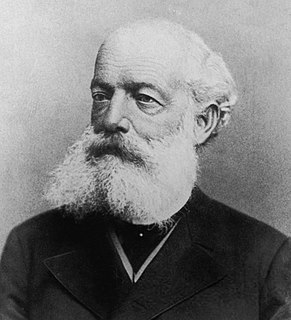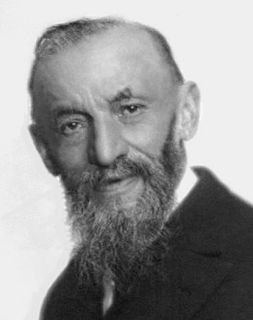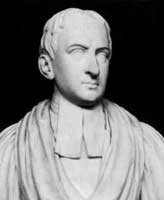A Quote by Isaac Newton
I have not been able to discover the cause of those properties of gravity from phenomena, and I frame no hypotheses; for whatever is not deduced from the phenomena is to be called a hypothesis, and hypotheses, whether metaphysical or physical, whether of occult qualities or mechanical, have no place in experimental philosophy.
Related Quotes
In thermodynamics as well as in other branches of molecular physics , the laws of phenomena have to a certain extent been anticipated, and their investigation facilitated, by the aid of hypotheses as to occult molecular structures and motions with which such phenomena are assumed to be connected. The hypothesis which has answered that purpose in the case of thermodynamics, is called that of "molecular vortices," or otherwise, the "centrifugal theory of elasticity.
The question whether atoms exist or not... belongs rather to metaphysics. In chemistry we have only to decide whether the assumption of atoms is an hypothesis adapted to the explanation of chemical phenomena... whether a further development of the atomic hypothesis promises to advance our knowledge of the mechanism of chemical phenomena... I rather expect that we shall some day find, for what we now call atoms, a mathematico-mechanical explanation, which will render an account of atomic weight, of atomicity, and of numerous other properties of the so-called atoms.
In experimental philosophy, we are to look upon propositions inferred by general induction from phenomena as accurately or very nearly true, notwithstanding any contrary hypotheses that may be imagined, till such time as other phenomena occur by which they may either be made more accurate or liable to exceptions.
The hypotheses which we accept ought to explain phenomena which we have observed. But they ought to do more than this; our hypotheses ought to foretell phenomena which have not yet been observed; ... because if the rule prevails, it includes all cases; and will determine them all, if we can only calculate its real consequences. Hence it will predict the results of new combinations, as well as explain the appearances which have occurred in old ones. And that it does this with certainty and correctness, is one mode in which the hypothesis is to be verified as right and useful.
Certainly it is permitted to anyone to put forward whatever hypotheses he wishes, and to develop the logical consequences contained in those hypotheses. But in order that this work merit the name of Geometry, it is necessary that these hypotheses or postulates express the result of the more simple and elementary observations of physical figures.
God is one among several hypotheses to account for the phenomena of human destiny, and it is now proving to be an inadequate hypothesis. To a great many people, including myself, this realization is a great relief, both intellectually and morally. It frees us to explore the real phenomena for which the God hypothesis seeks to account, to define them more accurately, and to work for a more satisfying set of concepts.
But shall gravity be therefore called an occult cause, and thrown out of philosophy, because the cause of gravity is occult and not yet discovered? Those who affirm this, should be careful not to fall into an absurdity that may overturn the foundations of all philosophy. For causes usually proceed in a continued chain from those that are more compounded to those that are more simple; when we are arrived at the most simple cause we can go no farther ... These most simple causes will you then call occult and reject them? Then you must reject those that immediately depend on them.
Our design, not respecting arts, but philosophy, and our subject, not manual, but natural powers, we consider chiefly those things which relate to gravity, levity, elastic force, the resistance of fluids, and the like forces, whether attractive or impulsive; and therefore we offer this work as mathematical principles of philosophy; for all the difficulty of philosophy seems to consist in this from the phenomena of motions to investigate the forces of nature, and then from these forces to demonstrate the other phenomena.
During the last two centuries and a half, physical knowledge has been gradually made to rest upon a basis which it had not before. It has become mathematical. The question now is, not whether this or that hypothesis is better or worse to the pure thought, but whether it accords with observed phenomena in those consequences which can be shown necessarily to follow from it, if it be true
In real science a hypothesis can never be proved true...A science which confines itself to correlating phenomena can never learn anything about the reality underlying the phenomena, while a science which goes further than this and introduces hypotheses about reality, can never acquire certain knowledge of a positive kind about reality; in whatever way we proceed, this is forever denied us.
The best and safest way of philosophising seems to be, first to enquire diligently into the properties of things, and to establish those properties by experiences [experiments] and then to proceed slowly to hypotheses for the explanation of them. For hypotheses should be employed only in explaining the properties of things, but not assumed in determining them; unless so far as they may furnish experiments.
Given any rule, however "fundamental" or "necessary" for science, there are always circumstances when it is advisable not only to ignore the rule, but to adopt its opposite. For example, there are circumstances when it is advisable to introduce, elaborate and defend ad hoc hypotheses, or hypotheses which contradict well-established and generally accepted experimental results, or hypotheses whose content is smaller than the content of the existing and empirically adequate alternative, or self-inconsistent hypotheses, and so on.
It is possible to express the laws of thermodynamics in the form of independent principles , deduced by induction from the facts of observation and experiment, without reference to any hypothesis as to the occult molecular operations with which the sensible phenomena may be conceived to be connected; and that course will be followed in the body of the present treatise. But, in giving a brief historical sketch of the progress of thermodynamics, the progress of the hypothesis of thermic molecular motions cannot be wholly separated from that of the purely inductive theory.


































